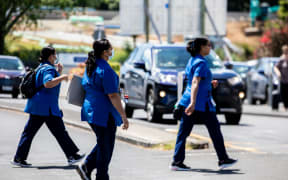
File photo. Photo: 123RF
The NZ Nurses Organisation is urging the government to pay students doing mandatory on-the-job training to combat so called "placement poverty".
As part of their training, student nurses complete compulsory, unpaid hospital placements and have to cover the cost of petrol, parking, uniforms and, in some cases, accommodation. They often have to give up paid part-time work to complete this practical training - also known as practicum.
From next year, the Australian government will pay teachers, midwives and nurses A$320 (NZ$353) a week during their mandatory placements - but it will be means-tested.
Campaigners and students here have been fighting for a similar payment, and previous Health Minister Andrew Little had considered it for third-year students.
Nurses Organisation kaiwhakahaere Kerri Nuku told Checkpoint that there was a "significant crisis" in nursing recruitment.
"We need to grow our own. The cost of living alone is diabolical, so imagine being a student over three years trying to work, and juggle placement, and trying to juggle the responsibilities of the profession."
Checkpoint host Lisa Owen asked how nursing compared with other professions - for example, teaching - where students were not paid to train?
"We have seen during Covid [lockdowns] how nurses stood up during that.... Wherever there is a crisis in a professional workforce, there should be an exceptional amount of work that's gone in to support the ongoing sustainability and recruitment, retention and succession of nursing, as in other professional groups."
Nursing was an essential service, Nuku said.
"They're like police - [who have] a six-month training programme. With nursing, it is a three-year programme and an entry to practice after that, so it is a significantly longer duration that the nurses have to go through than, I understand, police."
The Nursing Council required students to complete at least 1100 clinical hours of practical placements across their three-year degree - or about 10 full weeks of work each year.
This created a "significant amount of pressure" on nursing students, Nuku said.
Some were having to drop out of practicum because they could not afford the petrol to get there, or did not have a registered, warranted car.
The cost of uniforms only added to the financial pressure, Nuku said, and some students were applying to the union's hardship fund for food and power costs.
"[Anything] that tips their equilibrium ... significantly compromises them."
Registered nurses always supported the training of students as "the future of nursing", but the union was seeing a "huge, skills-based drainage going overseas".
The union was calling on the government to have discussions over paid placements, with the living wage as a starting point.
"That's the least we would expect... and it shouldn't impact on other grants or subsidies they are getting."
Last November, Te Whatu Ora chief people officer Andrew Slater said the agency was continuing to look at ways to support students during their clinical placements, including more earn-and-learn pilot programmes, some of which were focused on healthcare assistants and nurses.
"We're continuing to assess the outcomes of those programmes to ensure they are supporting students as they go through their course of study."




